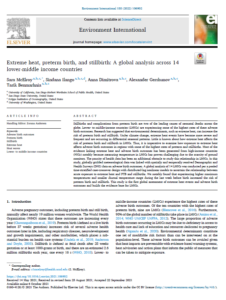
Abstract
Stillbirths and complications from preterm birth are two of the leading causes of neonatal deaths across the globe. Lower- to middle-income countries (LMICs) are experiencing some of the highest rates of these adverse birth outcomes. Research has suggested that environmental determinants, such as extreme heat, can increase the risk of preterm birth and stillbirth. Under climate change, extreme heat events have become more severe and frequent and are occurring in differential seasonal patterns. Little is known about how extreme heat affects the risk of preterm birth and stillbirth in LMICs. Thus, it is imperative to examine how exposure to extreme heat affects adverse birth outcomes in regions with some of the highest rates of preterm and stillbirths. Most of the evidence linking extreme heat and adverse birth outcomes has been generated from high-income countries (HICs) notably because measuring temperature in LMICs has proven challenging due to the scarcity of ground monitors. The paucity of health data has been an additional obstacle to study this relationship in LMICs. In this study, globally gridded meteorological data was linked with spatially and temporally resolved Demographic and Health Surveys (DHS) data on adverse birth outcomes. A global analysis of 14 LMICs was conducted per a pooled time-stratified case-crossover design with distributed-lag nonlinear models to ascertain the relationship between acute exposure to extreme heat and PTB and stillbirths. We notably found that experiencing higher maximum temperatures and smaller diurnal temperature range during the last week before birth increased the risk of preterm birth and stillbirth. This study is the first global assessment of extreme heat events and adverse birth outcomes and builds the evidence base for LMICs.